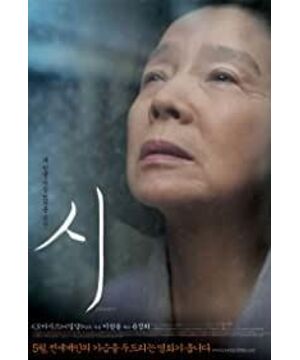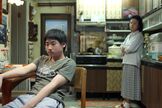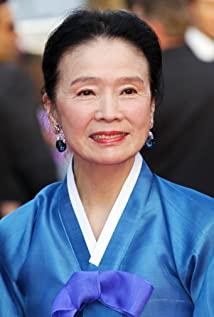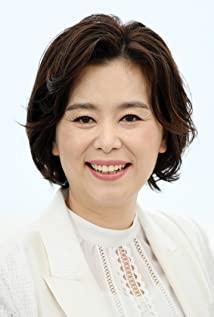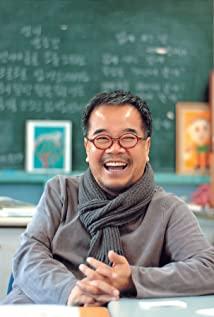, a
Korean director Li Cangdong's film "Poetry", uses video to "defend" poetry. It's just that the traditional "defense" resorts to words, while Li Cangdong uses a more contemporary film language. To defend in words, the object of its defense is mostly related to life, property and freedom. Socrates faced the court, talking endlessly, defending himself, and it was a matter of life and death. When Li Cangdong came here, what he defended was a special way of speaking, "poetry", or rhetoric. Using the language of film to defend the poem is more paradoxical. The reason is that the film has a "responsibility" for the depression or decline of poetry. If there is no film and television to compete for attention, perhaps the readers of poetry will not be as scattered as they are today.
However, whether it is using words to defend life or using images to defend "words", there are similarities between the two. Fundamentally, it's all about justifying a certain way of life. Socrates defends the philosophical way of life, while Lee Chang-dong recommends a poetic life for audiences; the former is only for a few, while the latter is at least suitable for most city dwellers. People in the countryside, in this vision, live in the rich poetry of nature, but they don't know it.
No matter what the object of the argument is, the basic premise of the argument is that one party faces a difficult situation. For Li Cangdong, the premise of arguing for poetry is that poetry is on the verge of death. This is clearly expressed in the conversation between the poets in the film. Whether poetry is dead, or to put it another way, what is the value and significance of discussing this issue, I do not know. However, the related issues are related to daily life and are not professional, so we can talk about one or two points.
A sign of the death of poetry, it is said that the number of readers is decreasing and the poet is lonely. A popular expression, saying that those who read poetry now have not written many poems yet. This cannot be established. According to my limited understanding, a person who writes poetry must read poetry; even if he is a little arrogant and doesn't like to read other people's, he must be a reader of his own works. It can be inferred that there will always be some people, no matter what, who occasionally read a few songs. In this way, there are more people who read poetry than write poetry.
The poet is lonely, and it should be said on a case-by-case basis. Only in this era of mechanical reproduction can those great poets break through the limitations of regions and countries and become part of world literature. Before that, the greatest glory of an important figure in today's literary history was to become a national poet. And more literati, but a little bit of poetic title in the place. But that's it, the poets of the predecessors are still envied by the younger generations. Because, in today's era, lonely poets are mainly those local little poets; their pursuits are indeed less understood and supported. As for those international poets, even if they are lonely, they will become lonely in the world because of their position; they care about human beings and have less understanding of human hearts.
But even so, local poets are not entirely hopeless. Art is still fresh, so is fashion, just like people's tastes. Poets with a somewhat global vision, position themselves in a broader perspective. Locality, in an age of globalization, is a selling point in itself. It's just that the locality here cannot be too local, because too local means that it is difficult for others to "understand" in a short period of time. The passion for consumption can only be made into a sale if it is stimulated in a short period of time.
In such a situation, people who care about poetry are a little tired of those old faces in the poetry world. There is an inexplicable aversion to the identity of "poet". Always a little dissatisfied. Therefore, finding more authentic poets, like digging for treasures, has become a major event for researchers. But what kind of poets can be regarded as "real" and "authentic" is a little unclear. But anyway, as long as people are looking, there is some comfort.
Second,
as a literary film, the narrative rhythm of "Poem" is neither rushed nor slow, and the emotional performance of the characters in the film is genuine and delicate. Coupled with the beautiful picture of the movie, what it brings to the audience is indeed a beautiful enjoyment. However, in my opinion, this film also touches on quite a few ideological issues and the fundamental consideration of the survival of modern people, so it is especially worth talking about a few more points.
Li Cangdong's "Poem" is a hymn to women, nature and beauty. This stems from the Romantic tradition. In the old bachelor Kant, the beauty of a woman, "that is a well-proportioned body, the fit, the color of the eyes and the face that matches gracefully, is also endearing in the midst of flowers and will make people cool. The pure beauty that is praised." ("On the Sense of Beauty and Sublime") The image of the protagonist Ms. Yang Meizi in the film is a perfect interpretation of this point.
Sixty-six-year-old Yang Meizi earns a meager income and lives on subsidies and part-time jobs. Moreover, she has to take her grandson and worry about his life and growth. However, the burden of life did not destroy her love and pursuit of beauty. She likes to dress up and always wears clean and beautiful clothes, because she believes: "People, no matter when, the body must be clean. When the body is clean, the mind will be clean."
According to the characters in the film, a person who loves poetry is like a head Wear flowers. And the ladies are especially beautiful, because they have flowers in their hearts. Beauty is in nature. Women and flowers, raindrops, water surfaces, apricots, crops, etc., are beautiful because they are or are closer to nature. Poetry is the rediscovery of nature and the self, the true self, and the connection with nature; therefore, only by being close to nature and telling the heart, can it be possible to achieve good poetry.
Yang Meizi is innocent and innocent, like a little girl, "likes to say outrageous things" and "tweeps like a lark every day". Yang Meizi loves flowers, as long as she sees flowers, she feels happy. As soon as she arrived in the country, she fell in love with apricots and crape myrtle flowers, lingering in the embrace of nature, so that she forgot the "task" of "negotiation". Anytime, anywhere, she jots down such sentences, "Blood, like blood, red flower". It is said that the cockscomb is "the shield that protects us". To extend this statement, perhaps it can be said that nature protects us, just like Yang Meizi loves her grandson. But in many cases, human beings are like the ignorant grandson Park Zhongxu, contradicting and hurting nature from time to time. This idea that nature itself is perfect and has intrinsic value originated in the post-industrial western society. However, this idea, to a certain extent, refers to the traditional view of the Orientals on nature, and has a new development. There is no definite answer to whether it is effective to solve the problem of the loss of meaning of modern people with this kind of thinking. However, I believe that this big idea constitutes the ideological background of the film "Poem".
Others in the poetry class, in the name of poetry, tell their own stories, all of which are truly moving. Among the narrators, most of them are women. In the atmosphere of poetry, they tell the stories of childhood, relatives and lovers, and in sharing, they find themselves again. Poetry builds a temporary platform for people's spiritual communication. A woman recounts how she taught her grandmother to sing, and in this narration, she was able to return to the old days and communicate with her relatives spiritually. Some people say that the spring in the church is sadly beautiful, and the years go by in a distinct sense of the seasons. There is also a woman who tells about her experience of childbirth, giving birth in pain, like giving birth to a sun; the birth of life is surprising and grateful. It is the "words" of poetry that bring those distant people, events, and feelings forward, and build a rounded world full of emotion and meaning. In this world, people are connected and intimate; here they find their sense of life and find the most authentic things.
Only by being close to nature can we understand life and love. And those objects in the mundane world are not worth thinking about, so the best way is to forget them. The protagonist Yang Mezi in the film, while rediscovering herself, began to forget "nouns" due to Alzheimer's disease. The order is as follows: soap, electricity, wallet, long-distance bus station... It is not difficult to see that the objects referred to by these nouns , are artificial products, not necessary for life. Only those who remain curious about the world can maintain concern, love and respect for life. The film begins with the suicide of the young girl Park Ji-jin by diving. Yang Mi-ja, who does not understand the truth, is full of concern for this untimely life from the very beginning. She tried to understand a little more about it, but found that people were very apathetic about it. Even if the incident happened later, the parents of the boys did not care about the death of the girl; what they were more concerned about was how to get out of this incident. Only Ms. Yang Meizi collected words in her life and finally wrote the poem "The Song of Anes" to complete her life-and-death dialogue with the girl Park Ji-jin.
In contrast to the beauty of women and nature, the men in Poetry have little positive value. From teenagers to old men, it's just like that. A group of teenagers, at their heroic age, contributed to the death of a young girl in a collective crime. Six middle-aged male parents, plus a few insiders, such as reporters and principals, all care about how to solve specific problems. Even Park Sang-tae, a good policeman, likes to tell dirty jokes while reciting poetry, which makes Yang Meizi feel disgusted and thinks it is a blasphemy against poetry. The old man that Yang Meizi served as an hourly worker was said to have been the president, but in the real world, he was an ugly disabled person. Here, we can roughly see that this bad old man is the "representative" of men in the film: they once held or are holding power, but they have brought endless harm to the world; In fact, their vitality is withered, and they can only get erections by taking medicine; they seem complete, but in fact they are incomplete. Only in the union with a woman can they "be a man again". This ugly crowd, they care most, nothing more than desire. And Ms. Yang Meizi, after a fierce "ideological struggle", made the old man's wish come true with a decision like "I won't go to hell, who will go to hell". In the scene of making love with the old man, Yang Meizi's face is extremely moving; like a bodhisattva, holy and noble.
There is also a thread running through the entire film, the debate between poetry and science. There is no doubt that the director is on the side of the poem, condemning the evils of science. There are at least a few clues that touch on this issue. There is a scene in the film, when Yang Meizi "faces" her grandson's computer, she is in a mess, and she doesn't know where to put her hands and feet. What technology has brought about is the estrangement and difficulty in communication between family members. In the realm of science, men are the majority; they use knowledge to manipulate power and do whatever they want. It is worth noting that the place where the girl Park Ji-jin was gang-raped was the school's science laboratory. This is not accidental, it has a strong symbolic meaning.
Poetry and science, see the world in a different way. Looking at the world with the eyes of poetry, it is not detached from the surrounding environment, and what it sees is not far; what it discovers is only the human heart and the life connected with the human heart. Poetry values the particular "this one" and respects individual people and things, and its so-called universality is also achieved through individual things. The scientific vision is not to see with ordinary eyes, but to observe with purpose. Observation has its specific theoretical load, and its range is relatively determined. The principles of science, beyond the here and now, have a very high universality and are thus separated from life. Generally speaking, poetry and science are well balanced. However, because today's science is extraordinarily powerful through the power of technology, it has to be criticized.
The
above analysis mainly takes the film as the starting point, and has a preliminary description of the relevant issues. I generally think that Li Cangdong's film "Poem" has a basic ideological tone, that is, natural perfectionism. This view holds that nature is perfect and that modern people can only return to nature if they want to live a good life. Poetry and woman, on the other hand, are nearer to nature, and therefore almost perfect. I don't quite agree with this view because of its obvious childishness. Between nature and civilization (man-made), I generally think that only civilization can make people become human; although human civilization has developed to this day, there are many fatal problems. Between men and women, I may see them more as human beings, each with their own strengths and weaknesses, rather than simply and straightforwardly dividing them, and "installing" all the good values on either gender.
In the following analysis, I will refer to the traditional Chinese literati's views on nature, and their views on issues such as gentleman, truth, and freedom based on nature; The way of life, in my opinion, is not worthy of praise. And the natural perfectionism mentioned above is combined with feminism in the film. But in Chinese thought, its appreciation of nature is mostly viewed from a male perspective, which is basically male-centrism. On this point, it is necessary to make a statement.
Taking nature, especially plants, as an aesthetic object was only possible in the entire human history until the age of agriculture. And the general aestheticization of nature is quite recent in popular, romanticized discourse. After the Renaissance, Western talents gradually aestheticized nature. From Lu Xun's point of view, in China, taking nature as an aesthetic object began in the Wei and Jin Dynasties. This at least shows that in human history, there was a long period of time when nature provided human beings with resources for survival, but also brought great oppression to human existence. At that time, perfecting nature was almost unimaginable. In this way, we can roughly understand that the aestheticization of nature is the product of civilization.
It is a fairly common mentality for traditional Chinese literati to link the personality of a gentleman with nature in order to show his nobleness or to be free from mundane affairs. Here is an example. For example, Guo Xi wrote in "Linquan Gaozhi·Shanshui Xun":
What is the purpose of a gentleman who loves his husband's landscape? The nourishment of the hills and gardens is always there; the arrogance of springs and stones is always pleasant; the seclusion of fishing and woodcutters is always suitable; the flying of monkeys and cranes is always close to them;
The main idea of Guo Xi's words is to be close to the mountains and rivers, comfortable and friendly; and this is far different from the hustle and bustle of the world, which people hate. I think, to understand the meaning of Guo Xi's words, there is a basic premise, which should be understood. That is to say, the literati in ancient China were not born with a special love for nature, so that they had an instinctive aversion to the tediousness of officialdom. Logically, I would not rule out such a person. But more often than not, those who claim to have great pleasure in the natural world have a lot of resentment in their hearts. They may be ostracized by their colleagues, slandered by villains, or due to various other reasons, all in all, they are unsatisfactory in their careers, so when they have to, they retreat to the pastoral fields and make up a set of self-comforting words.
In contemporary times, the most extreme descendant of this tradition is Gu Cheng. He once wrote: "The natural artistic conception of Chinese philosophy is to free people from limited thoughts and become a natural person, also called a real person." Here, Gu Cheng connects nature and truth, and the opposite is nothing but vulgarity. Contemporary Chinese literati who love to travel like to connect nature and freedom to show their freedom and ease. In fact, the freedom here is nothing but leisure. Deng Xiaomang said, "What is Xiaoyao? It means getting out of society and going into nature, and you are free. Today, many people like to travel everywhere and go to nature to 'relax'. Relaxation is leisure." Leisure, has nothing to do with freedom in the modern sense.
The above-mentioned realism or travel is a typical elegant thing. In addition to this extreme, "real people" have another extreme. Hu Ping analyzed: "Real people often love to do two extreme things: either extremely vulgar, such as farming and begging for food, the purpose of which is only It is to maintain survival; or it is extremely elegant, such as Guanhai composing poetry, its meaning is all about expressing yourself. Activities in between can easily make you feel 'alienated'." But "extreme" should not be done , fundamentally, lies in its unsustainability. To be elegant is to be contrived, and elegant to be indecent. Undressing in public is acceptable, once or twice, to express dissent or resist something. And blindly kitsch, repeatedly, is very unnatural. As Hu Yilin analyzed: "A person who does not wear clothes is also a kind of decoration, a kind of dressing. You strip naked in a crowd, which is more 'unnatural' than any dressing and disguise." In the final analysis, it is "people The 'nature' of nature lies precisely in its 'unnaturalness'. Humans must have culture to survive as human beings."
Nature itself is not perfect, and it is only the imagination of the weak to regard imperfect things as perfect. In my opinion, taking nature as an aesthetic object and using it as a basis to justify an overly personal way of life is not enough. Perhaps man is really such an animal, that only in public life can he realize his own value. It is undoubtedly the right of the intellectual to live a reclusive life; however, it is certainly not worthy of praise. In contrast to Western intellectuals, Lu Gusun said: "They seldom have the retreatism of 'seeing Nanshan leisurely' like the Seven Sages of Bamboo Forest and Tao Yuanming. This kind of thing is hard to find among Western intellectuals, even when prosecution is rampant. time." "The masculine side of Western intellectuals, I think, was a very important reason for their influence back then."
January 22, 2013
[This article was published in "Chinese Graduate Students", Issue 6, 2013]
View more about Poetry reviews


